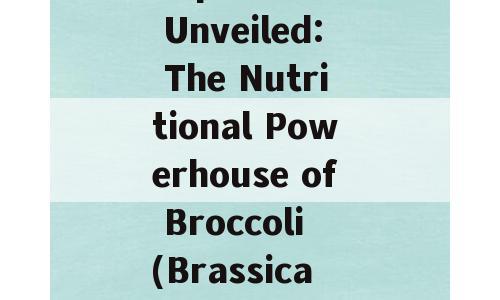Introduction:
In the vast realm of superfoods, one vegetable stands out for its impressive array of health benefits: broccoli, also known as Brassica oleracea. Packed with essential nutrients, broccoli has been a staple in healthy diets for centuries. This article delves into the nutritional wonders of broccoli, its potential health benefits, and how to incorporate it into your daily meals.
The Nutritional Profile of Broccoli:
Broccoli, a member of the cruciferous vegetable family, is a nutritional powerhouse. It is rich in vitamins, minerals, and antioxidants. According to the United States Department of Agriculture (USDA), one cup of cooked broccoli contains approximately 55 calories, 2.6 grams of protein, 4.2 grams of fiber, and essential nutrients such as vitamin C, vitamin K, vitamin A, potassium, and iron (USDA, 2021).
Health Benefits of Broccoli:
1、Cancer Prevention: Broccoli contains compounds called sulforaphanes, which have been shown to help prevent cancer by activating enzymes that help in detoxifying harmful substances in the body. Studies suggest that broccoli may reduce the risk of several types of cancer, including breast, prostate, and colon cancer (National Cancer Institute, 2021).
2、Heart Health: The high fiber content in broccoli can help lower cholesterol levels, which is beneficial for heart health. Additionally, the vegetable's ability to reduce inflammation may also play a role in preventing heart disease (American Heart Association, 2021).
3、Bone Health: Broccoli is an excellent source of vitamin K, which is essential for bone health. It also contains calcium and magnesium, two other minerals that contribute to strong bones.
4、Immune System Support: The high vitamin C content in broccoli helps support the immune system, making it an ideal food during cold and flu season.
5、Weight Management: Broccoli is low in calories and high in fiber, making it a great food for weight management. The fiber helps you feel full longer, reducing the likelihood of overeating.
Incorporating Broccoli into Your Diet:
1、Cooking Methods: Broccoli can be steamed, sautéed, roasted, or even eaten raw in salads. Steaming is often recommended as it retains more of the vegetable's nutrients compared to boiling.
2、Seasonings: Enhance the flavor of broccoli by adding garlic, lemon juice, olive oil, or herbs like basil and thyme.
3、Creative Recipes: Try adding broccoli to pasta dishes, stir-fries, soups, or as a side dish. It can also be blended into *** oothies or soups for a nutritious boost.
Conclusion:
Broccoli, or Brassica oleracea, is a nutritional gem that should be included in your diet. Its wide range of health benefits, coupled with its versatility in cooking, makes it an excellent choice for anyone looking to improve their health and well-being. Don't underestimate the power of this cruciferous superfood!
References:
- American Heart Association. (2021). Diet and Heart Disease. Retrieved from https://www.heart.org/en/healthy-living/healthy-eating/eat- *** art/nutrition-basics/diet-and-heart-disease
- National Cancer Institute. (2021). Broccoli and Cancer Prevention. Retrieved from https://www.cancer.gov/about-cancer/causes-prevention/prevention/diet/broccoli-fact-sheet
- United States Department of Agriculture (USDA). (2021). Nutrient Data for 11120, Broccoli, cooked, boiled, drained, without salt. Retrieved from https://ndb.nal.usda.gov/ndb/foods/show/11120















还没有评论,来说两句吧...